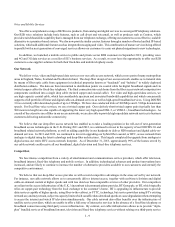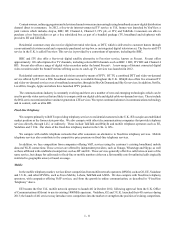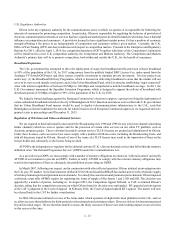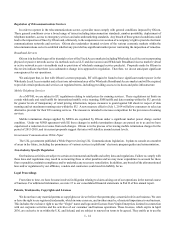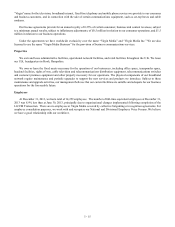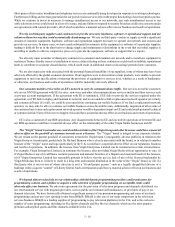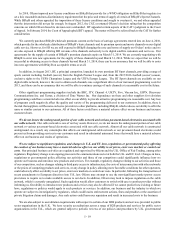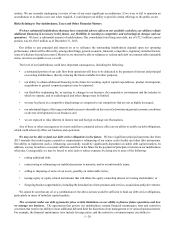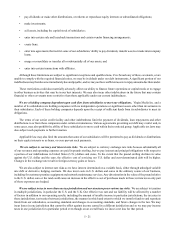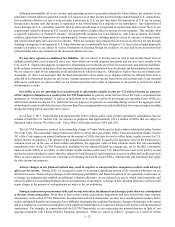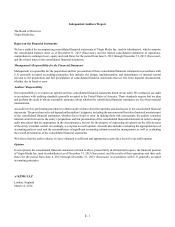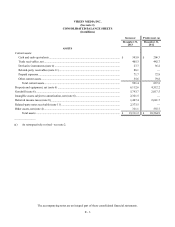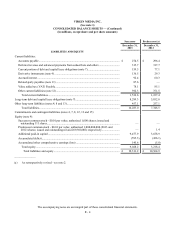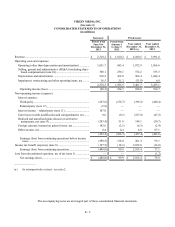Virgin Media 2013 Annual Report Download - page 21
Download and view the complete annual report
Please find page 21 of the 2013 Virgin Media annual report below. You can navigate through the pages in the report by either clicking on the pages listed below, or by using the keyword search tool below to find specific information within the annual report.I - 19
In 2010, Ofcom imposed new license conditions on BSkyB that provide for a WMO obligation on BSkyB that regulate (or
set a fair, reasonable and non-discriminatory requirement for) the price and terms of supply of certain of BSkyB’s Sports Channels.
While BSkyB and others appealed the imposition of these license conditions and sought to overturn it, we and others appealed
that the intervention did not go far enough. In August 2012, the CAT, overturned Ofcom’s decision ruling that the competition
concerns on which Ofcom based its decision were unfounded. BT appealed certain aspects of the CAT’s judgment to the Court
of Appeal. In February 2014, the Court of Appeal upheld BT’s appeal. The matter will now be referred back to the CAT for further
consideration.
We currently purchase BSkyB wholesale premium content on the basis of carriage agreements entered into on June 4, 2010,
which provide for the wholesale distribution of BSkyB’s basic channels and its premium sports and movie channels on our digital
cable service. However, for SD we are still exposed to BSkyB changing the rate card terms of supply on 60 days’ notice and we
are also exposed to BSkyB offering HD versions of its channels exclusively to its digital satellite customers and not to us. Our
agreements for the supply of certain of BSkyB’s premium channels expire on March 31, 2014. We are currently negotiating with
BSkyB to enter into new agreements for the supply of these channels beyond March 31, 2014. While we expect that we will be
successful in obtaining access to these channels beyond March 31, 2014, there can be no assurance that we will be able to enter
into new agreements with BSkyB on acceptable terms or at all.
In addition, in August 2013, BT, a principal competitor, launched its own premium BT Sport channels, providing a range of
sports content including football (soccer) from the English Premier League and, from the 2015/2016 football (soccer) season,
exclusive rights to the UEFA Champions League and the UEFA Europa League. The BT Sport channels are available on our
digital cable network, however, the cost to obtain such channels was a significant driver of our increased programming costs for
2013, and there can be no assurance that we will be able to continue carriage of such channels at a reasonable cost in the future.
Other significant programming suppliers include the BBC, ITV, Channel 4, UKTV, Five, Viacom Inc., ESPN, Discovery
Communications Inc. and Turner, a division of Time Warner Inc. Our dependence on these and other suppliers for television
programming could have a material adverse effect on our ability to provide attractive programming at a reasonable cost. Any loss
of programs could negatively affect the quality and variety of the programming delivered to our customers. In addition, there is
the risk that suppliers will become exclusive providers to other platforms, including BSkyB, which reduces our ability to offer the
same or similar content to our customers. All of these factors could have a material adverse effect on our business and increase
customer churn.
We do not insure the underground portion of our cable network and various pavement-based electronics associated with
our cable network. Our cable network is one of our key assets. However, we do not insure the underground portion of our cable
network or various pavement-based electronics associated with our cable network. Almost all our cable network is constructed
underground. As a result, any catastrophe that affects our underground cable network or our pavement-based electronics could
prevent us from providing services to our customers and result in substantial uninsured losses that would have a material adverse
effect on our business and results of operations.
We are subject to significant regulation, and changes in U.K. and EU laws, regulations or governmental policy affecting
the conduct of our business may have a material adverse effect on our ability to set prices, enter new markets or control our
costs. Our principal business activities are regulated and supervised by Ofcom and the U.K. Office of Fair Trading, among other
regulators. Regulatory change is an ongoing process in the communications sector at both the U.K. and EU level. Changes in laws,
regulations or governmental policy affecting our activities and those of our competitors could significantly influence how we
operate our business and introduce new products and services. For example, regulatory changes relating to our activities and those
of our competitors, such as changes relating to third party access to infrastructure, the costs of interconnection with other networks
or the prices of competing products and services, or any change in policy allowing more favorable conditions for other operators,
could adversely affect our ability to set prices, enter new markets or control our costs. In particular, following the transposition of
recent amendments to European directives into U.K. law, Ofcom may attempt to use the non-significant market power access
provisions to require us to make available access to our ducts. In addition, Ofcom may look to impose regulation on the cable
network, which is currently unregulated. Such regulation would allow customers to switch with ease to another provider without
informing us. Our ability to introduce new products and services may also be affected if we cannot predict how existing or future
laws, regulations or policies would apply to such products or services. In addition, our business and the industry in which we
operate are subject to investigation by regulators, which could lead to enforcement actions, fines and penalties or the assertion of
private litigation claims and damages. Any such action could harm our reputation and result in increased costs to the business.
We are also subject to accreditation requirements with respect to certain of our B2B products and services provided to public
sector organizations in the U.K. We have security accreditations across a range of B2B products and services for public sector
organizations in the U.K., which are granted subject to periodic reviews of our policies and procedures by U.K. governmental


